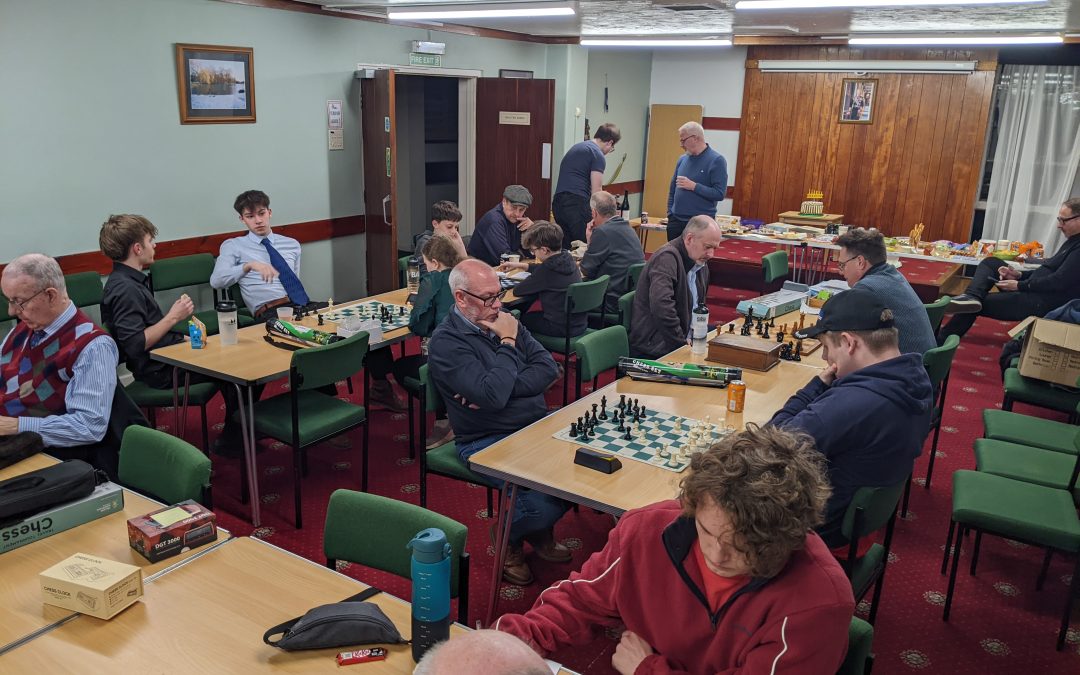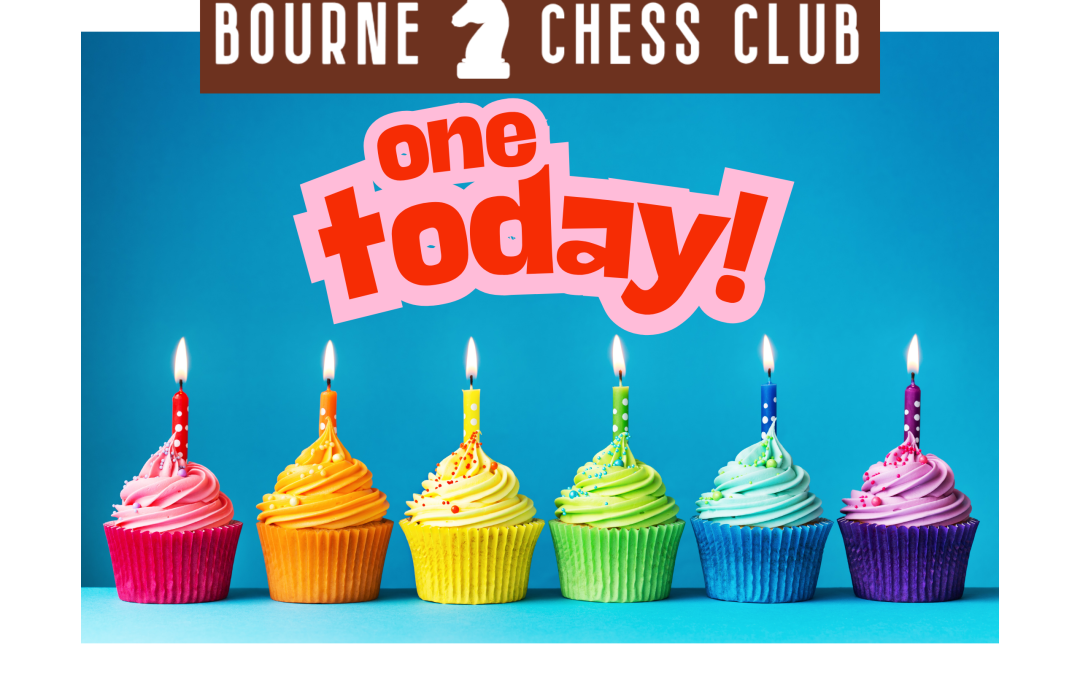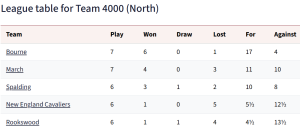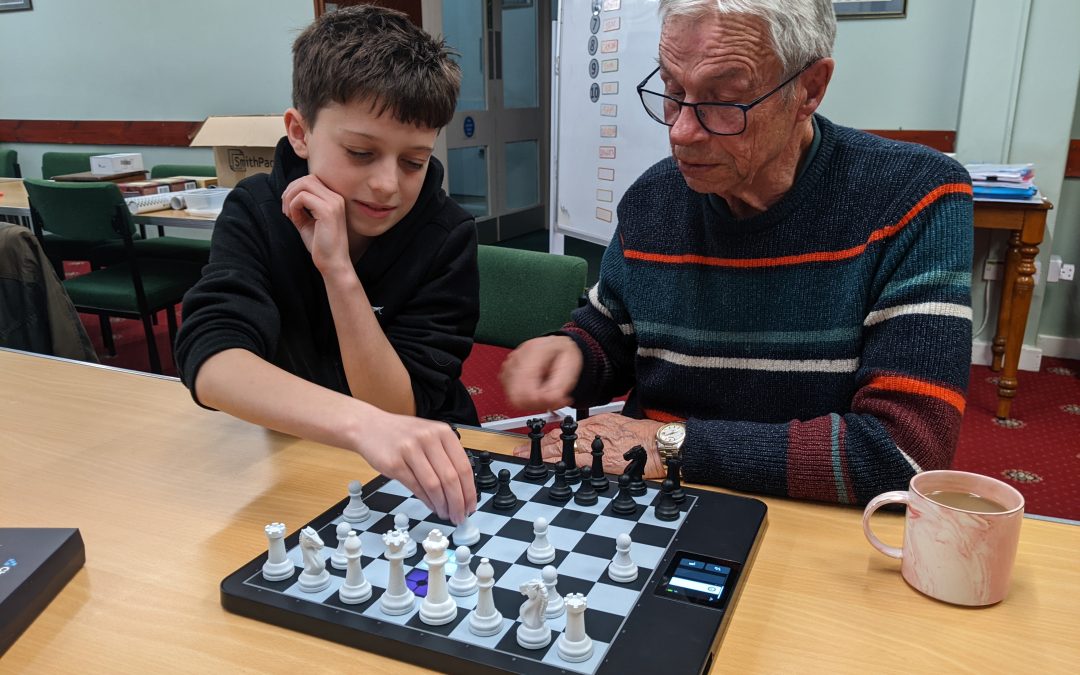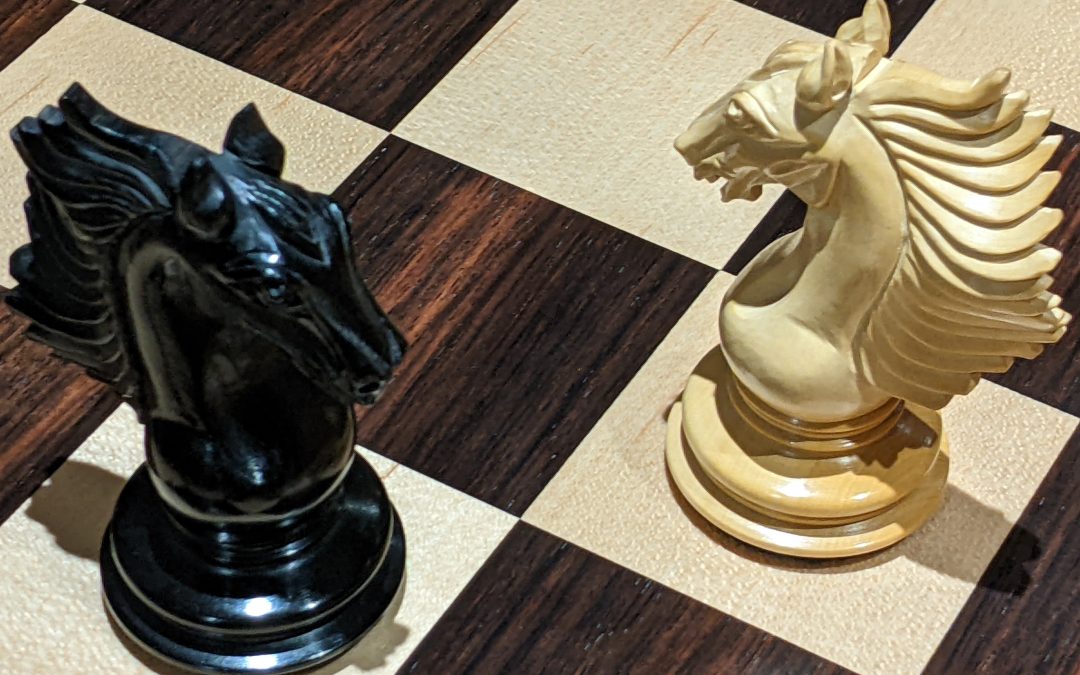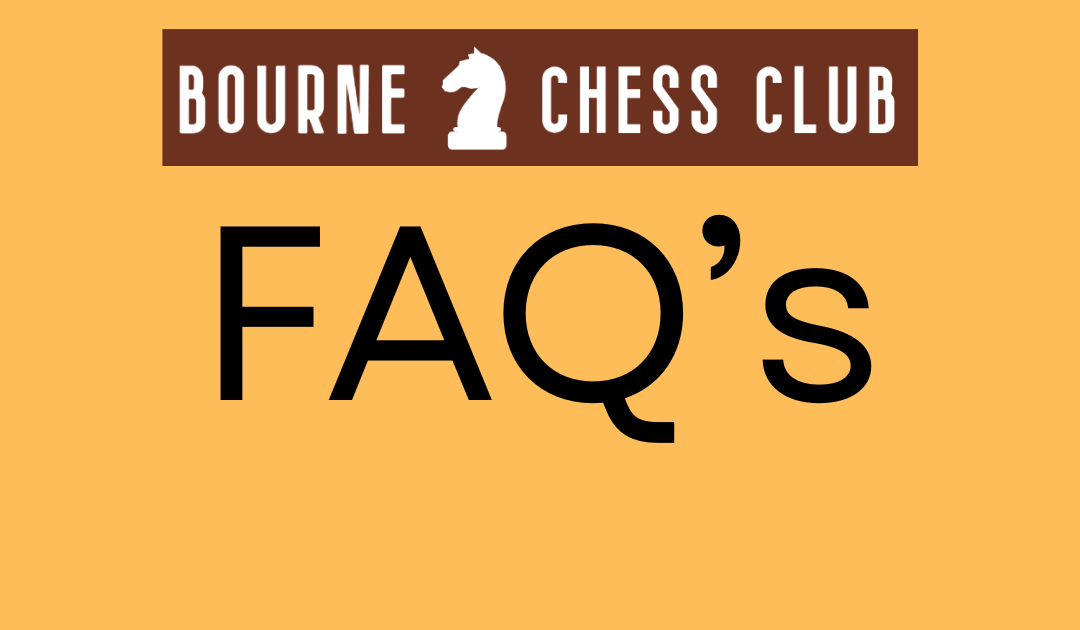
Frequently asked questions
For BCC members and potential newcomers, here are some of the frequently asked questions:
Are you looking for new members?
Yes! We are a relatively new chess club starting in March 2024, and we would love to welcome newcomers to both the Juniors club and also our Thursday evening club. For those who like competitive chess, we won the “4200” league as outright winners both north and south of our region, in our first season of competitive play. And we are very keen to keep on winning more competitions so please join us!
Is there an easy way to learn chess?
One of the wonders of the game is its depth. When players start to play, they generally make their moves too quickly. It is very important to think, double-check, before making a move. It is one thing considering your own plans of attack but you must also get into the habit of considering what your opponent is planning on doing next. It is extremely difficult to get better at chess if you play your moves too quickly.
Is chess played in silence all the time?
No, at Bourne Chess Club we have a social chess evening at various times of the year that is held on Tuesday evenings between 7.30-9.30pm People who like to chat while they play are very welcome to come along in this setting as it is relaxed and very friendly. You are also welcome to our free teas and coffees while you play. Contact Wake House or our Club Secretary to find out when these Social Chess evenings are being run. Competitive chess however, is played in silence, absolute silence and when there are competitive matches being played in the Baxter Room, we uphold a strict complete silence.
I am interested in playing for Bourne Chess Club in the Lincs Chess Association, whereabouts would we play?
Louth, Grmisby, Appleby Frodingham, Lincoln, Grantham, Skegness. There is the possibility of a north/south divide for Div 2 in the 2025/2026 season, as it was pre-covid. The furthest north you would travel would be Lincoln.
Do I need to learn all the openings?
No, but the key concepts of developing pieces in openings is good to learn. It can be useful to learn an opening that you like, as it matches your style of play. In other words it tends to create mid-games that suit your style of playing chess.
Do I have to write my moves down?
Not if you are playing social chess, but it can be surprising how many times players regret not having recorded the game when it concludes, for one reason or another.
If my opponent forfeits a game on Swiss Manager, do I still get a point for the win?
Yes, but it is only displayed as a + and – in the result table. Your grades would not be altered as a result of this.
Are my grades ever changed when we use Swiss Manager?
Only when the organiser has set it up as rated and the participants are Gold members with the ECF. Otherwise, no.
Do I get a parking ticket if I forget to register my car registration number at Wake House?
Wake House do ask patrons of the car park to register their car at the numerous consoles in the building, but are keen for visitors to not be financially penalised should they forget. If you do receive a parking fine, then it can be rescinded by contacting Wake House here
What’s the difference between Swiss Manager and Chess-Results.com?
Swiss Manager is the software that is used to create the pairings, enter results and it keeps track of progress. Chess-results.com is a platform to see the tournament results – you can’t change anything on chess-results.com
Do I get grade changes for playing in the external leagues?
After a certain number of games with established players, meaning players with stable grades, then yes. About 10 games of this sort is needed for the ECF to establish a reasonably accurate grade for you. The games you play on internal leagues especially against opponents who also do not have stable grades has negligible impact on your grade. On your ECF grade “K” is established, “P” is provisional.
What is the benefit of using the ECF LMS? (English Chess Federation League Management System)
It is one place to go to, where your club’s tournaments can be listed. You can easily see who you have played, who you haven’t, when you are due to play next, the current standings for each player + loads more
Is it ok for all members to chat on the online WhatsApp main channel for the club?
No, the BCC Safeguarding Policy does not permit online chat between under 18’s and over 18’s and vice-versa, on the Club’s WhatsApp main channel. BCC does all that it reasonably can to protect members from online abuse and that can even occur between under 18’s. In terms of organising matches, arrangements can either be made in-person at the club, or via parents on the main channel. The Safeguarding Officer for BCC is Tom Ingram and can be contacted at: Bournechessclub@gmail.com
Is Swiss Manager a free resource?
No, we have purchased a licence to enable us to use the ‘full’ version.
How will I know if my child will like the Juniors Club?
Bring them down on a Tuesday evening at 6.30-7.30pm Our Parent Liason Officer Justine will be happy to assist in making you feel comfortable. We have a thriving Juniors Club headed up by Sam who is progressing the juniors through a structured programme to help them learn chess. We meet at The Windmill room at Wake House. You are very welcome!
How do I learn how to use the clocks?
With repeated practice. The less you use them, the less you will be able to change time formats.
Which side of the board should the clock be on?
Some clubs insist that whoever plays white has the clock to their left. Some prefer, whichever side it is, it is consistent on every board.
Do the time formats change depending on the league you are in?
Yes. Generally speaking, the higher ability leagues tend to have longer time formats e.g. 70mins +15secs Lower ability leagues will often be 50mins +10secs What is known as Standard Play is 60mins or more duration, a Rapid Play format is less than 60mins but more than 10mins; but that includes the increments so 45mins + 10 secs for example is just within the Rapid Play format being 10secs x 60 = 10mins in increments, therefore 55mins in total. Blitz is 10mins or less.
I would like to consider playing for Bourne in the external leagues within the Cambridgeshire County Chess Association, but what kinds of locations do the other clubs play at?
Spalding, March, St. Ives, Peterborough, St. Neots, Cambridge, Ely, Godmanchester. Please also bear in mind that , under 18’s must travel to away games with parents/guardian/carer.
For the internal tournaments at the club, do I get told who I am to play next and when?
BCC uses different platforms to play tournaments. We have an active whatsapp group for the booking up of matches between players. Members are encouraged to monitor chess.com, chess-results.com and the ‘ladder’ at the club – all of these are tools to be utilised for the smooth running of tournaments. But ultimately it is the responsibility of each player to organise their matches.
Do I always have to record my moves?
When in a game with less than 5 mins left on your clock AND the time control has <30 sec increments, then no. But if the time control has 30 sec + increments per move then yes, even when the clock goes under 5 mins.
Can you give me an idea of the grades for playing in the external leagues BCC plays in?
Neither of the leagues we play in are capped with a maximum grade total for the team as a whole, but Div 3 in the CCCA is around 1200-1600 and Div 2 in the LCA has an individual cap for each player of u1900
Who decides if an illegal move has been played?
In organised tournaments, arbiters, but in local leagues, there needs to be an agreement typically between the two captains concerned. It is good etiquette for the host captain to involve the away captain when dealing with any disputes.
Are the rules strictly enforced?
We are supposed to be following the Rules of Chess, so touch move, using two hands to castle, rules on promoting, playing moves with one hand and touching the clock with the other…..all of these things are supposed to be correctly done. We shouldn’t be distracting our opponent with repeated offers of a draw, we shouldn’t press the clock until the move has been completed etc etc etc
Are there age limits on when you can enter local leagues?
Not strictly no. There are safeguarding issues though to consider for <18’s and that includes the travel to/from the away venue.
What does “4200” and “7000” mean on the leagues?
It is the accumulated total of the players grades. For the 4200, the grades of the three players playing on one team should not exceed 4200. For 7000, the four players’ grades should not exceed 7000.
Is there an order to the boards?
Yes, board 1 is your highest ability player, and the ability lessens with board 2 and 3 etc
If my club has entered two teams in an external regional league, say the 4200, can we swap players around the two teams?
No. But if there was a team in 4200, and another in 7000, you could swap between them.
Is there any benefit to me to attend external tournaments not in my local league?
Yes. Not only will you get the opportunity to play ‘established’ players to build up your grade, but for a tournament lasting a couple of days, you will have gained a great deal of experience. And you could have 5+ matches to analyse and improve on.
When I play for my club in the regional external leagues, do I have to get my opponent to sign my move sheet and hand a copy of it to the host captain?
It is good practice to. The home captain will then have a record of all the games with the results clearly marked and counter-signed by both players; quite handy should there be any dispute later on.
Is there a limit to how many times I play for my club?
No, but your captain will be the one who decides on the team selection.
I’m not great with ‘touch move’, will that be ok if I play in a league?
No. It is one of the rules of chess, and should be followed at all times. Some opponents might accept it if you make an error, but they do not have to. They are perfectly within their rights to insist you move the piece you touched first.
How do you decide who plays white or black for an external league match for your club?
The away team board 1 player, plays white. And then it is alternated for board 2 and 3 etc
If I want to promote a queen but have no queens available, am I ok to turn a rook upside down?
Strictly speaking, no. That is not a queen. However, if there is literally no other option, then needs must.
If I need to go to the toilet, do we stop the clock?
No, the only time to stop a clock is to ask for an arbiter or captain to answer a query.
Can I adjust my pieces when it is my opponent’s turn?
No, that is distraction. The time to declare “j’adoube” is on YOUR move and BEFORE you touch any of your pieces.
How do I record a win/loss?
Win=1 Loss=0 Draw=½
So you might have: 1-0 (white win) or 0-1 (black win) or ½ – ½ (draw)
Am I ok to stand up and walk around when it is not my move?
Yes. You can, in theory, do that when it IS your move!
In the internal leagues at Bourne Chess Club, do I have to arrange the matches with my opponents?
Yes, each player is responsible for organising their matches with other players. Bear in mind that each tournament will have it’s own rules and so it is in everyone’s interests to read the rules.
If my opponent makes an illegal move, how much time do we add to my clock time?
For standard play it is 2 mins, for rapid or blitz it is 1 minute. The second illegal move will result in losing a game!
Is it true that I only have to record my moves, not my opponent’s moves?
Yes. And also when a draw is offered, by way of an = on your move sheet
Can you give some examples of automatically drawn games?
King v King + Bishop
King v King + Knight
King + Bishop v King + Bishop (when the Bishops are of the same colour)
How do I write my moves down?
Chess notation does not need to be done if you are playing social chess, but in competitive play it is a requirement. It might seem at first quite daunting but actually, with not much practice, it becomes second nature.
e2 – e4 means moving the pawn at position e2 to position e4 (the board is marked up with letters and numbers to help you)
Nb1-Nc3 or just Nc3 means moving the knight to position c3. Notice pawns do not need a P to denote the pawn move.
Bc1 – Be3 or just Be3 means moving the bishop from position c1 to position e3
Q for queen, K for king, R for rook.
A capture is denoted by an “x”. Nb1xBc3 or NxB The knight on b1 captures the bishop on c3
If, after your move, you place your opponent in check, you add a “+” to the move: Bf5+
If, after your move, you place your opponent in checkmate, you add a “++” or “#” to the move: Bf5#
If you promote a pawn on the b file to a queen, you write b8=Q or b8Q
If you capture a pawn via en-passant, you write dxe3 or dxe3e.p. meaning the d pawn captures the pawn on the e file and finishes up on the e3 square.
If you castle kingside (“short”) you write o-o If you castle queenside (“long”) you write o-o-o


